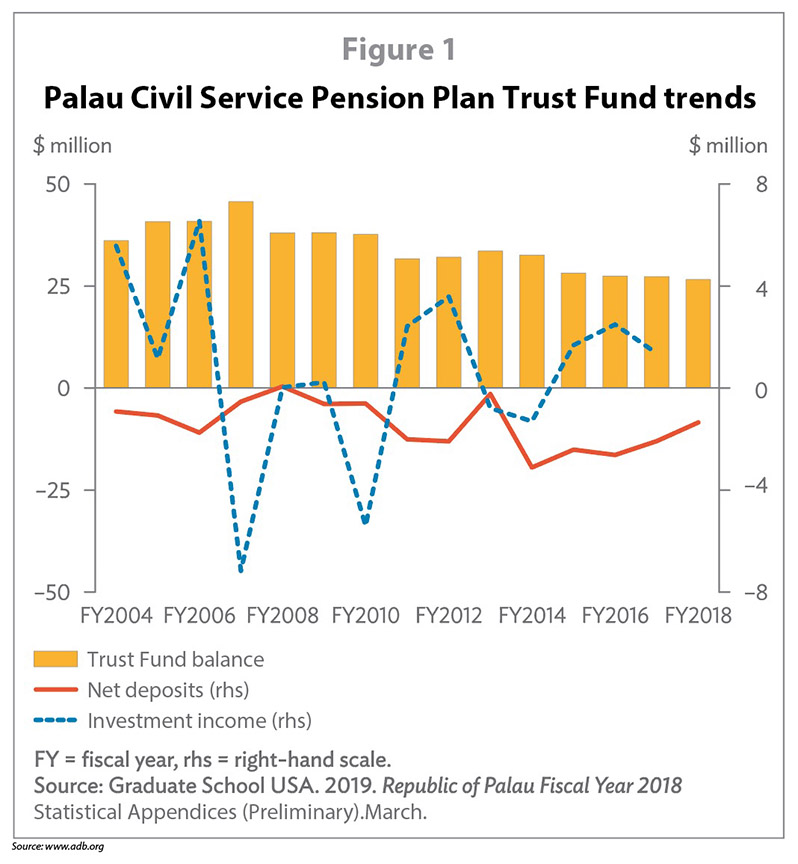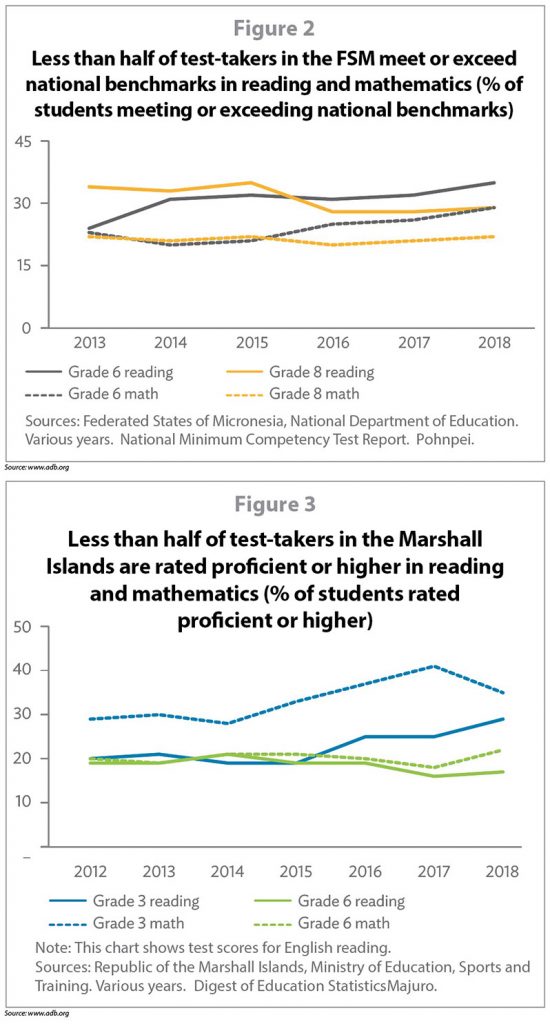The following items related to Palau, the Marshall Islands and the Federated States of Micronesia are from the Asian Development Bank’s July 2019 “Pacific Economic Monitor.” The monitor provides an update of developments in Pacific economies. The articles were first published by the Asian Development Bank (www.adb.org).
 The deterioration of the ongoing trade conflict between China and the United States along with weaker consumer and business confidence in the euro area combine for a weaker global economic outlook. By contrast, the Pacific is seen to recover from a disaster-related slowdown in 2018 with solid rates of expansion through 2019 and 2020.
The deterioration of the ongoing trade conflict between China and the United States along with weaker consumer and business confidence in the euro area combine for a weaker global economic outlook. By contrast, the Pacific is seen to recover from a disaster-related slowdown in 2018 with solid rates of expansion through 2019 and 2020.
Lessons learned from the impacts of the global economic crisis a decade ago have since provided the impetus for substantial social development gains in the Pacific. These gains, in turn, are underpinned by steady improvements in social protection, health and education policies, plus complementary investments in not only schools and hospitals, but also in critical urban services infrastructure. However, further progress is necessary, particularly in strengthening support to vulnerable groups including the unemployed, women, children and older persons.
Reforming the Civil Service Pension Plan
The Civil Service Pension Plan is a social security fund that covers public sector officials and employees in Palau. Historically, the CSPP has been underfunded (i.e. contributions have been insufficient to cover future payouts) and the situation was aggravated by the global economic crisis. There has been some recovery in investment returns since 2008 but contingent liabilities related to the CSPP continue to pose a major fiscal risk (Figure 1).
The latest audit results show a net pension liability of $259.4 million (equivalent to 91% of GDP), nearly 10 times the size of fund assets, as of the end of fiscal 2018. Further, the audit reveals that based on projected payouts, the CSPP will be fully depleted as early as fiscal 2022, absent robust reforms to promote sustainability. This would pose an additional burden of about $6 million annually on the national government.
The government has implemented several stopgap measures aimed at improving the CSPP’s position. First, mandatory retirement after 30 years in public service has been removed. Second, half of the $50 increase in departure taxes (Pristine Palau Environmental Fee) implemented as part of the marine sanctuary bill passed in 2015, has been earmarked for direct transfers to the CSPP. Third, a 4% tax is now being levied on remittances of foreign workers with the proceeds being set aside to subsidize the CSPP. In total, transfers to the CSPP amounted to $1.1 million ($0.7 million from the share in departure taxes and $0.4 million from remittance taxes) in fiscal 2018. Despite these measures the financial position of the CSPP has continued to deteriorate. Relative to the previous year, net pension liability increased further by $9 million and the trust fund’s balance still fell by $0.7 million in fiscal 2018, stressing the need for further reforms.

CSPP developed a funding plan in April 2017 that proposed to increase contribution rates and effectively reduce benefits. However, the president deferred approval of these changes and the government instead has commissioned an actuarial atudy to come up with recommendations for more comprehensive reform. Initial recommendations of the actuarial study include
- an increase in the normal retirement age by one year every five years until the retirement age reaches 65 years;
- no change in current benefits to active employees and inactive members aged 55 years and over;
- benefit formula to remain at 2% for each year of service, but a new defined contribution scheme will be introduced to provide half of the benefits, with the other half from the current defined benefit plan;
- contributions of public sector employers and employees to be split between the new defined contribution scheme (3% each) and the existing defined benefit plan; and
- defined contribution scheme to be opened to private sector employers and employees.
This initial list of reforms appears to be a promising start toward steering the CSPP to a more sustainable footing. It also avoids a sharp increase in contribution rates along with sudden cuts in benefits, the combination of which is likely to be politically untenable. In view of the impending deadline in fiscal 2022, it is crucial to finalize and implement the reform plans immediately to save the CSPP in order to limit any future fiscal burden.
Building strong foundations: improving the quality of basic education
The predominantly young populations in both the Federated States of Micronesia and the Marshall Islands are a valuable resource that must be tapped to maximize future growth in these economies. A well-educated workforce realizes higher earnings over time, and contributes to improved health outcomes, social equity and cohesion, all of which ultimately contribute to reducing hardship and vulnerability.
Student performance at the primary level is important for shaping performance at higher levels of education, where correcting weak learning outcomes becomes more expensive amid broader social issues that can lead to disenfranchised youth.
Both the FSM and the Marshall Islands recognize the dire need to improve the quality of basic education, as reflected in its inclusion among national priorities in the countries’ respective national strategic development plans. Less than half of primary-level students in each country meet or exceed minimum competency standards for literacy and numeracy under their respective national standardized aptitude tests (Figures 2 and 3).
Such outcomes arise partly from poor teacher quality. From 2015 to 2017, an average of 17% of teachers in the FSM did not hold a 2-year associate degree, the nominal minimum qualification for teaching; an average of 33.2% of teachers in the Marshall Islands also did not have this qualification. Further, only the second year of the associate degree program focuses on teacher education courses, and learning opportunities at the professional level have lacked cohesion.
The FSM and the Marshall Islands must also contend with regular cuts in funding from the Compact of Free Association funds from the government of the United States, which are scheduled to cease in 2023. Grants under the countries’ Compact funds cover recurrent public expenditures in education as well as health and infrastructure, but those allocated to education are insufficient for addressing significant needs for teacher training or teaching and learning resources.
Supplemental education grants from the United States make up 100% of state education budgets in the FSM and about 69% of the national education budget in the Marshall Islands, but are not included in projections for sustainable disbursement from respective trust funds of the FSM and the Marshall Islands after 2023, meaning that these governments would have to find additional resources when these grants expire.
An Asian Development Bank project currently under way seeks to improve the quality of basic education in the FSM and the Marshall Islands through the following ways:
- Strengthen teacher preparation in the in-service and pre-service areas. Training 800 teachers in the FSM and 400 teachers in the Marshall Islands in the Quality Pedagogy Framework, an approach to advancing student learning that uses evidence-based factors such as social interaction, relevant and meaningful activities, and assessment for learning. This framework will be embedded in teacher education at both the college and professional levels, and in practice in the classroom.
- Strengthen the FSM and the Marshall Islands capacities to use student assessment to improve learning through current methodologies on student assessment, classroom assessment, and ensuring improvements to new national student assessment frameworks.
- Expand access to teaching and learning resources and materials for the classroom that meet bilingual teaching needs in both countries. Resources will also be digitized to ensure all learners can avail of contextually appropriate, culturally responsive resources such as open-source resources, readers in the vernacular language, and low-cost mobile and interactive learning tools.
- Strengthen school leadership and management by extending professional learning opportunities for school principals, fostering partnerships with parents and communities to improve students’ school readiness, and expanding school-based sustainable development projects.
The project is still in the early stages of implementation, but anecdotal evidence is promising. For instance, teacher education programs at the University of the South Pacific’s Marshall Islands campus and College of the Marshall Islands have already formally incorporated the Quality Pedagogy Framework developed under ADB assistance.
Inroads have been made to align pre-service and in-service teacher training, thereby creating a coherent system of expected proficiencies for all primary school teachers in both countries. In the FSM, the College of Micronesia-FSM is also incorporating the principles of the Quality Pedagogy Framework into its teacher education program. Complementary developments in the education sector will also help in supporting the achievement of project objectives. The FSM Teacher Certification Policy was updated and strengthened in 2016, and efforts are ongoing to introduce performance-based contracting for education (alongside health services) personnel. However, current arrangements still fall short of a well-functioning performance-based contracting system, which requires a clear set of objectives and performance indicators, systems for collecting and validating data on these indicators, and appropriate financial and nonfinancial incentives to motivate the achievement of agreed-upon goals and targets. These elements will need to be introduced to promote improvements in teacher quality and learning outcomes more effectively.
The project will provide more students the support they need to reach their full potential and, over time, build a stronger human capital base in these countries. The project has deliberately focused on strengthening the key existing education institutions necessary to improve the quality of the basic education system in each country. Further, by coordinating, collaborating and working together, the Marshall Islands and the FSM will be better able to deliver quality services efficiently and ensure resiliency after 2023 when U.S. support becomes uncertain.













